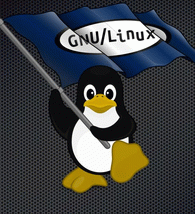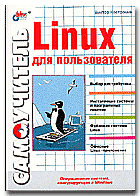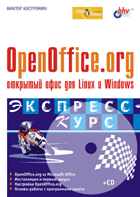Библиотека сайта rus-linux.net
Linux Compilers and AssemblersSEP 19, 2003 By Christopher Paul, Rafeeq Rehman. Article is provided courtesy of Prentice Hall. |
|
All development systems are essentially a combination of many tools. Compilers, assemblers and debuggers are integral parts of these development tools. Fortunately Linux has a large number of tools available for software developers. These tools have a very rich set of features that we shall discuss in this and coming chapters. The basic reason for including this chapter is to enable a reader to use compilers and assembler in a development environment in a productive way. However this chapter is not a tutorial on any language or programming technique. Examples of code listings presented in this chapter are very simple and are intended to demonstrate the function of development tools. GNU C compiler, most commonly known as GCC, is the most important part of this discussion. This compiler can be used to compile programs written in the following languages:
GCC recently added the capability to generate object code from Java source code. Work has also been done on Ada support. GNU assembler is often needed in projects where you want to have tight control over a particular part of code and want to write it in assembly language. Most of the time people also write boot code for embedded systems in assembly language. The compiler uses assembler during the compilation process to generate object code. In addition to the most common compilers, we shall also discuss the use of some less common languages in the Linux environment. These languages include the following:
The compilation process is completed in different stages. These stages are:
The GNU compiler takes help from many programs during this process and can be used to generate intermediate files. For example, the compiler can generate Assembly language code from a C source code file. This chapter provides information about the GNU set of compilers and how to build a software development environment using GNU tools. During this process you will also learn the building process for the GNU C library, most commonly known as glibc. 3.1 Introduction to GNU C and C++ CompilersThe GNU compiler, most commonly known as GCC, is not a single program. It is a large set of programs, libraries and other utilities that work together to build source code into executable form. A user, however, mostly interacts with gcc command. The gcc program acts as sort of a front end for compilers and other utilities. This section is an introduction to the compiler and its capabilities. 3.1.1 Languages Supported by GCCGCC is a family of compilers, also known as the GNU Compiler Collection. GCC supports multiple languages, including:
Front-end preprocessors for many other languages also exist for GCC. For example, you can use a Pascal language front end with GCC. C is the primary language and GCC supports ANSI/ISO standards put forward in 1989-90 and 1995-96. These standards are also sometimes called C90 and C95, respectively. Another revision of the ANSI/ISO C language standard was made in 1999 (known as C99), and GCC does not yet fully support this revision. You can find out the current status of support for this revision at http://gcc.gnu.org/gcc-3.0/c99status.html. Support for these variations in standards can be selected using command line switches when compiling programs. For example, to compile programs according to original 1989-90 standards, you can use one of the following command line switches: -ansi -std=c89 -std=iso9899:1990 The GCC compiler supports Objective C source code. Information on Objective C can be found in different books and online resources. However there is no standard for Objective C yet. Later in this chapter you will learn how to compile a simple program written in Objective C. GCC supports GNU Fortran language and we shall discuss later in this chapter how to compile programs written in Fortran. Support for Java is a new addition to GCC and we shall see how GCC handles Java code with the GCJ compiler. This compiler, which is a part of the GCC family of compilers, can create an executable object from Java source code files. Standard libraries are not part of the GCC compiler. You have to separately install libraries. The most common library used with the compiler is the GNU C library and we shall see how to get and install this library on Linux systems. The GNU C library (also known as glibc) provides support for:
For more information on languages supported by GCC, please see http://gcc.gnu.org/onlinedocs/gcc-3.0.2/gcc_2.html. 3.1.2 New Features in GCC 3.xThere are many new features in GNU compiler starting with version 3.0. Some of these are discussed below briefly. In addition to that, version 3.0.x also includes many fixes for bugs present in 2.x versions. 3.1.2.1 Optimization ImprovementsA major improvement in this version is new optimization features. Some of these features greatly improve compile and run-time performance. Important features are listed below.
3.1.2.2 Support of new LanguagesSupport of Java is now added through GCJ compiler. It includes a run-time library having non-GUI Java classes. 3.1.2.3 Language ImprovementsThere are some improvements in the support of different languages and these are listed below.
3.1.2.4 Addition of New TargetsSupport for the following platforms is added.
3.1.2.5 Target Specific ImprovementsSome of the improvements are as follows:
3.1.2.6 Improved DocumentationSignificant improvements in this area are:
3.1.2.7 Additional GCC Version 3.0.1 ImprovementsThis version includes some bug fixes in version 3.0. It also addresses some bugs for exception handling. A port to IBM S/390 is added and some improvements in cross-compiling are made. 3.1.2.8 Additional GCC Version 3.0.2 ImprovementsThis version mostly contains some bug fixes. 3.1.2.9 GCC Version 3.0.3 ImprovementsThis version contains some more bug fixes as well as improvement in generation of debugging information. At the time of revision of this book, GCC 3.1 is released and it has all of these features, among others. © 2003 Pearson Education, Inc. InformIT Division. All rights reserved. 800 East 96th Street Indianapolis, Indiana 46240 |






